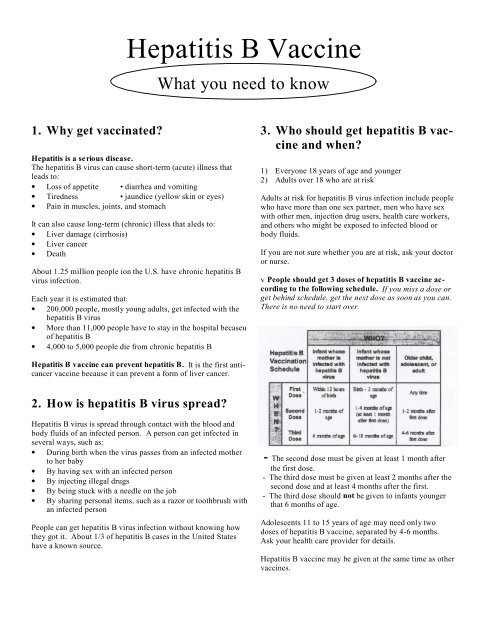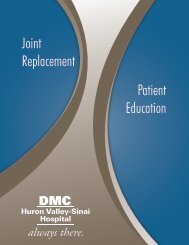Hepatitis B Vaccine
Hepatitis B Vaccine
Hepatitis B Vaccine
You also want an ePaper? Increase the reach of your titles
YUMPU automatically turns print PDFs into web optimized ePapers that Google loves.
<strong>Hepatitis</strong> B <strong>Vaccine</strong>What you need to know1. Why get vaccinated?<strong>Hepatitis</strong> is a serious disease.The hepatitis B virus can cause short-term (acute) illness thatleads to:• Loss of appetite • diarrhea and vomiting• Tiredness • jaundice (yellow skin or eyes)• Pain in muscles, joints, and stomachIt can also cause long-term (chronic) illess that aleds to:• Liver damage (cirrhosis)• Liver cancer• DeathAbout 1.25 million people ion the U.S. have chronic hepatitis Bvirus infection.Each year it is estimated that:• 200,000 people, mostly young adults, get infected with thehepatitis B virus• More than 11,000 people have to stay in the hospital becaseuof hepatitis B• 4,000 to 5,000 people die from chronic hepatitis B3. Who should get hepatitis B vaccineand when?1) Everyone 18 years of age and younger2) Adults over 18 who are at riskAdults at risk for hepatitis B virus infection include peoplewho have more than one sex partner, men who have sexwith other men, injection drug users, health care workers,and others who might be exposed to infected blood orbody fluids.If you are not sure whether you are at risk, ask your doctoror nurse.v People should get 3 doses of hepatitis B vaccine accordingto the following schedule. If you miss a dose orget behind schedule, get the next dose as soon as you can.There is no need to start over.<strong>Hepatitis</strong> B vaccine can prevent hepatitis B. It is the first anticancervaccine because it can prevent a form of liver cancer.2. How is hepatitis B virus spread?<strong>Hepatitis</strong> B virus is spread through contact with the blood andbody fluids of an infected person. A person can get infected inseveral ways, such as:• During birth when the virus passes from an infected motherto her baby• By having sex with an infected person• By injecting illegal drugs• By being stuck with a needle on the job• By sharing personal items, such as a razor or toothbrush withan infected personPeople can get hepatitis B virus infection without knowing howthey got it. About 1/3 of hepatitis B cases in the United Stateshave a known source.- The second dose must be given at least 1 month afterthe first dose.- The third dose must be given at least 2 months after thesecond dose and at least 4 months after the first.- The third dose should not be given to infants youngerthat 6 months of age.Adolescents 11 to 15 years of age may need only twodoses of hepatitis B vaccine, separated by 4-6 months.Ask your health care provider for details.<strong>Hepatitis</strong> B vaccine may be given at the same time as othervaccines.
4. Some people should not get hepatitisB vaccine or should wait.People should not get hepatitis B vaccine if they have everhad a life-threatening allergic reaction to baker’s yeast (thekind used for making bread) or to a previous dose of hepatitisB vaccine.People who are moderately or severely ill at the time the shotis scheduled should usually wait until they recover beforegetting hepatitis B vaccine.Ask your doctor or nurse for more information.5. What are the risks from hepatitisB vaccine?A vaccine, like any medicine, is capable of causing seriousproblems, such as severe allergic reactions. The risk ofhepatitis B vaccine causing serious harm, or death, is extremelysmall.Getting hepatitis B vaccine is much safer than getting hepatitisB disease.Most people who get hepatitis B vaccine do not have anyproblems with it.Mild problems• Soreness where the shot was given, lasting a day or two(up to 1 out of 11 children and adolescents, and about 1out of 4 adults)• Mild to moderate fever (up to 1 out of 14 children andadolescents and 1 out of 100 adults.• Ask your doctor, nurse, or health department to file a<strong>Vaccine</strong> Adverse Event Reporting System (VAERS)form, or call VAERS yourself at 1-800-822-7967.7. The National <strong>Vaccine</strong> InjuryCompensation ProgramIn the rare event that you or your child has a serious reactionto a vaccine, a federal program has been created to help youpay for the care of those who have been harmed.For details about the National <strong>Vaccine</strong> Injury CompensationProgram, call 1-800-338-2382 or visit the program’s websiteat: http://www.hrsa.gov/bhpr/vicp8. How can I learn more?• Ask your doctor or nurse. They can give you the vaccinepackage insert or suggest other sources of information.• Call your local or state health department’s immunizationprogram.• Contact the Centers for Disease Control and Prevention(CDC):-Call 1-800-232-2522 or 1-888-443-7232 (English)- Call 1-800-232-0233 (Español)- Visit the National Immunization Program’s website at: http://www.cdc.gov/nip or CDC’s <strong>Hepatitis</strong> Branch website at:http://www.cdc.gov/ncidod/diseases/hepatitis/Severe problems• Serious allergic reaction (very rare).6. What if there is a moderate or severereaction?What should I look for?U.S. DEPARTMENT OF HEALTH & HUMAN SERVICESCenters for Disease Control and PreventionNational Immunization ProgramAny unusual condition, such as serious allergic reaction, highfever or behavior changes. Signs of a serious allergic reactioncan include difficulty breathing, hoarseness or wheezing,hives, paleness, weakness, as fast heart beat or dizziness.If such a reaction were to occur, it would be within a fewminutes to a few hours after the shot.What should I do?• Call a doctor or get the person to a doctor right away.• Tell your doctor what happened, the date and time ithappened, and when the vaccination was given.<strong>Vaccine</strong> Information Statement (interim)<strong>Hepatitis</strong> B (8/9/00)42 U.S.C. § 300aa-26
















